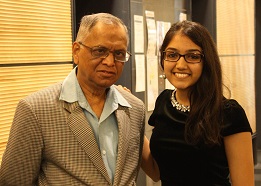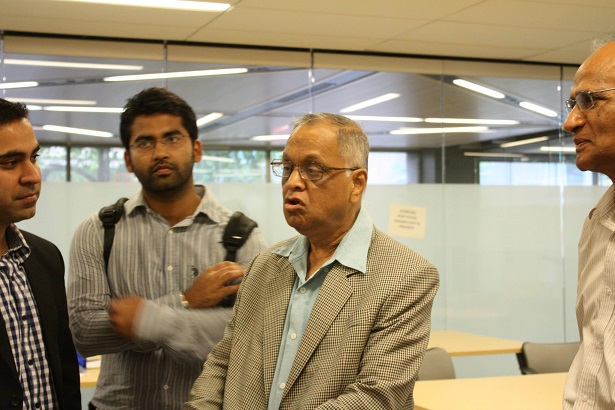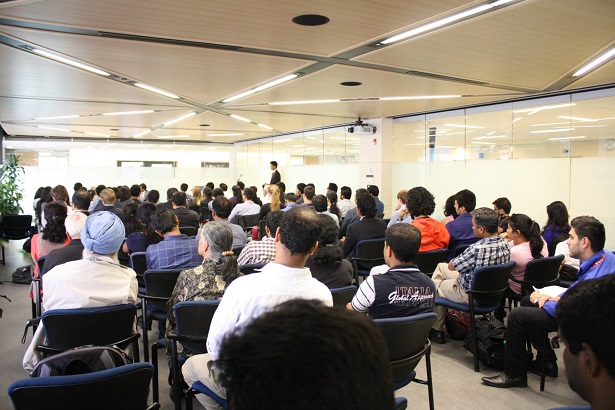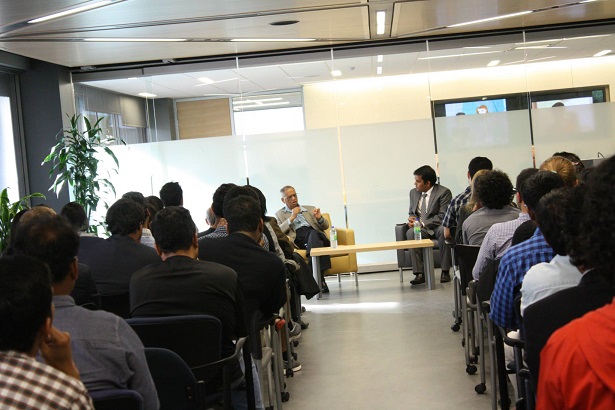Contribute
| Narayana Murthy Answers Questions From Students At McGill University, Canada |
Astha Agarwal
06/18/2015
Narayana Murthy, the co-founder of Infosys who is often
referred to as Father of the Indian IT sector, held a question-and-answer
session with university students at a grand reception hosted for him at McGill
University in Canada, one of the nation’s top two schools. Murthy also received
an honorary degree last week from McGill’s business school, the Desautels
Faculty of Management. The reception was hosted in conjunction by students from
McGill’s Entrepreneurs Society and Indian Students Association. Mr. Murthy discussed
his vision for the IT industry in India and his hopes for expansion of the
products Infosys provides. He also emphasized the necessity for competition from
foreign companies to increase IT growth in India. He shared his solution to the
lack of women executives in Indian IT, and encouraged McGill PhD students to
work on developing models of measuring productivity for telecommuting workers to
solve this problem. He spoke about the need for privatization of almost all
industries in India with the exception of higher education, which would require
a need-blind admissions approach. An Interview with Narayana Murthy: You have always been pro-globalization. It is amazing how in
1981 you positioned Infosys as an outward looking company meeting the global
standards. With the push for Make in India what lessons can the manufacturing
sector take from you? For us to succeed in India, we have to
bring into the country some leading global players in every area of
manufacturing, which the Prime Minister is now trying to do. We have to learn
from them and compete with them. The moment you keep global products out and
keep people away from competition, and start focusing only on whatever is
available in the country, the quality will go down. If we are not open minded
to invite the world’s best people to our country and create a congenial
environment for them, there would be no hope for India. In my own company, we took the option of
learning from these multinationals and the reality is that we grew faster than
them, were more profitable, retained employees better because we learned the
game from them and improved on them. The growth of Infosys has been parallel to growth of Indian
economy. From a modest capital of $250, Infosys has risen to a $36 billion
market cap. Did you envision this journey or was it more accidental? We had to provide different business
value propositions and we had to provide better quality in software. In 1981, large
projects required 100 to 200 man-years, and their success rate was 45% in the
United States. People would spend millions of dollars and jump their project.
So we said our objective is to get 95-98% success rate of these projects. What
was taking 100 hours last year should take 90 hours this year, and 80 hours
next year. In every project there is a class of
activity that requires considerable interaction with customer. It should be developed
on the customer site. Other activities have very little interaction with
customers. We said we will deliver these tasks from remote developments in
countries like India and at some point of time in China. About 20% has to be
developed on the customer side and 80% in remote places, in such a way that the
customer gets tremendous benefits and instead of taking up 1 project, a
customer could take up 1.5 projects. With the growth in export expected from services sector, IT has
to take the lead in innovation. Where do you see the sector going from here? When the Indian companies went to
customers sometime during the early 2000s, customers said, here is Accenture
that has consulting, software services, and business process management. So
they are a one-stop shop and they connect the boardroom with the boiler room,
whereas you guys just provide software services. Therefore, it is difficult for
us to work with you, because those guys are able to connect. That’s why Indian
companies took consulting on one side and business process management on
another side. As companies do more reengineering of their processes, they
realize there is greater opportunity for outsourcing business process
management. That is where I believe the industry is going pretty fast. Can you see Infosys in the future making products
that are open to the public, for people to use at home? I agree that we need to do more, but the
problem with products is that you need to have the required smartness to embed
yourself into the DNA of corporations like Microsoft has done through its
exchange server. In my company, we don’t want to touch the exchange server.
Mails are coming and going, so why would we change it and put some other thing.
Because of that server, Microsoft Office is also bought and because I want
Microsoft Exchange, I use Windows. Products have an innate tentativeness as they
are easily replaceable. If you have attached yourself to the DNA of
organizations then it is very different. The key is to get to such products which
are not easily replaceable. Do you feel that railways in India, like
airports, should be privatized? Railways have to be privatized. Till
1948 or so, lots of companies operating in the area of railways in India were
all private. It’s only after we got independence that we started nationalizing
them. The government has to stick to its mandatory functions including monetary
policy, law and order, etc. It should be possible for almost every other area
to be privatized because our own experience for 16+ years in public governance
systems of these areas has been less than exemplary. However, there is one
issue here. I am still not a great fan of higher
education being in the private sector, unless they operate on a need-blind
basis. If the private sector can operate on a need-blind basis, then it will be
alright. But in a country like India, where poverty is much higher than in Canada
or the US, it is much harder to operate on that model. So we will have to come
up with a model where even if education operates in the private sector, the
government will have to offer huge subsidies on a per- student basis. Do you foresee that corporates can come ahead
and take the lead in higher education in universities in US and Canada? In the last five years, 90% of new
universities that have been started are all by corporates or by a group of
enlightened individuals who have teamed up with corporates and started it. Every
one of these universities must learn to operate in a need-blind basis;
otherwise, we will create a society that is not fair and that does not have
compassion. As the industry is fairly male dominated, what
steps does Infosys take to encourage equality? Out of 25,000 software engineering
trainees that we recruited this year, 49% were women. But if you ask how many
VP executives we have who are women, there are none. We still have not come out with models
of measuring productivity for telecommuting. Therefore, while a lot of people
have talked about operating from home, most corporations in private don’t
encourage that. So therefore, we are not making the lives of our women
employees easier because we insist on their coming to the office. What I personally believe is that for a
wonderful business school like this one, you should work on models of
productivity. There could be 4 or 5 Ph.D. students, one of whom will go to
retail industry and work on models of productivity for managerial or sales
staff in that industry. Then if those theses are released, it becomes very easy
for the industry to absorb those and create models of productivity. Today we see a lot of students starting companies and even
dropping out of school for the same. What do you think about this and what
would your advice be to student entrepreneurs? There are several examples of people who
dropped out of school and became very famous entrepreneurs. But there are a
much larger number of people who plunged into entrepreneurship when they were
students, and we don’t hear of them. It’s not that anybody who leaves college
and gets into entrepreneurship when he or she is in college will succeed. One, you must have an idea whose
differentiated business value to the market can be expressed in a simple
sentence. If you can’t, your customers and employees won’t join you and venture
capitalists won’t support you. Second, it is very important for you people to
think of some method of assessing the market using very little money. While your idea might be extraordinary, it is
very important to pitch it to the market and assess if the market is ready to
buy your idea. Third, entrepreneurship is all about
deferred gratification, so make sacrifices today in hopes that tomorrow will
bring a fortune. You will have to undergo considerable discomfort in initial
years, be away from loved ones, take much less salary than you deserve, stay in
inexpensive hotels, and get rejected by everybody and his brother in your
initial years. Finally, you need people who understand
technicalities of your idea, and you need people who understand how to sell it.
If you don’t have people who know how to sell, don’t go to the market. You need
somebody who understands finance. You need people who know how to manage money,
because money is very scarce in the initial days and those who know how to
manage it will save you. Get a great idea, a great team, great
values, and a market that is ready, and the rest is all very simple. What we see today is that money is a huge
driving factor for students looking for jobs or even entrepreneurship but for
you, even after all the success of Infosys, you continue sticking to the
'Simple life, High thinking' principle. What is it that keeps you grounded?
Have there been instances when your children called you out for not buying
expensive cars or travelling in first class? We have been very fortunate in that my
wife has given our children a good value system and a good education. My
daughter went to Stanford, and my son did his Ph.D. from Harvard. They have a
good education and good values, and they understand that it is very important
to connect with the less fortunate sections of society not only in India, but
also in the US and UK. I am convinced that the only way societies can create
good citizens is with the help of mothers who spend so much time for the
betterment of children, and so all of us must be very grateful to mothers,
because without their sacrifice and without their focus on betterment of children,
society would not progress. We tend to compare the Silicon Valley of
California to Bangalore. Do you ever see Bangalore reaching the level of
performance of California? While I would very much like to say yes,
I think it’s unlikely, at least in the next 20 years for a very simple reason. The
US and Canadian higher education systems are the most advanced in the world.
They are oriented towards applying what you learn in the classroom to find
solutions to the problems around you. Second, Silicon Valley has created such a
wonderful learning environment that the level of the whole environment goes up
when Facebook succeeds or Google succeeds. It’s not just one company. The entire
ecosystem becomes better. Failure is not looked down upon in the US, whereas in
a society like India we are not very comfortable talking about failure. So that
is a big mindset change. That will take a good 20, 30, 40 years to change. I
don’t see how Bangalore can become like the Valley in the near future. Is there any advice you would like to give
students? All I would say is that values are very
important. Whatever you do, ask yourself this question: Will this action of
mine enhance respect for myself and for my entrepreneurship? If you ask this
question, you will go from strength to strength to strength, because at the end
of the day if you receive respect from every one of your stakeholders,
customers, employees, investors, vendor partners, and government of the land
and the society, your revenues will grow, you will get better and better
employees, you will get better quality investors, and the society will look at
you with lots of affection and consequently your market capitalization will
grow. So ask the question, will my action enhance respect for myself and for my
company?
You may also access this article through our web-site http://www.lokvani.com/



